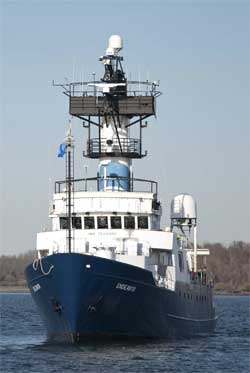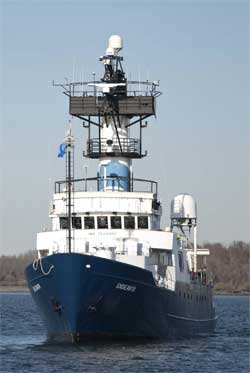 NARRAGANSETT, R.I. – January 17, 2012 – When the University of Rhode Island’s research ship Endeavor topped off its 53,000 gallon fuel tanks last month, it filled up with refined biodiesel, making it the first ship in the U.S. research fleet to use the alternative fuel. It’s the first step in the University’s plan to transform the 185-foot vessel into the most energy-efficient and “green” research vessel in the country.
NARRAGANSETT, R.I. – January 17, 2012 – When the University of Rhode Island’s research ship Endeavor topped off its 53,000 gallon fuel tanks last month, it filled up with refined biodiesel, making it the first ship in the U.S. research fleet to use the alternative fuel. It’s the first step in the University’s plan to transform the 185-foot vessel into the most energy-efficient and “green” research vessel in the country.
“It is vitally important that as we study the marine environment around the world on this great research vessel that we have the smallest environmental impact possible,” said Dennis Nixon, the associate dean for research and administration at URI’s Graduate School of Oceanography. “The first step in that transformation was the policy decision to use locally-produced biodiesel fuel for the ship’s generators and main engine. We are committed to using biodiesel whenever the ship refuels in Rhode Island, and we will attempt to secure biodiesel when it refuels in distant ports as well.”
About 14,000 gallons of B5 biodiesel, produced by Newport Biodiesel and blended and delivered by Malloy Biodiesel, were delivered to the ship in December. The fuel contains about five percent biofuel mixed with diesel, and it generally costs slightly less per gallon than regular diesel fuel. Nixon said the goal is to gradually increase the percentage of biofuel to about 20 percent.
The ship relies upon three diesel generators and a 3,000 horsepower engine to power all of its operations at sea.
The URI Foundation has established a Greening the Endeavor Fund dedicated to providing funds to continue to reduce the environmental impact of the ship’s operation. The fund will provide for more efficient lighting, galley appliances, water heaters, water makers, and other equipment, as well as for upgrading engine seals to allow for the use of progressively higher amounts of biodiesel fuel.
Nixon believes that by increasing the efficiency of the equipment on the ship, electrical demand may be reduced so much that the Endeavor could operate on just one generator at a time instead of two.
“That will save us thousands of gallons of fuel, make the ship much more quiet, and reduce harmful emissions,” he said. “The more biodiesel we use, the fewer stack emissions we have.”
According to Tom Glennon, director of marine operations at the Graduate School of Oceanography, the next step in the greening of the Endeavor will be to switch from using petroleum-based hydraulic fluids to biodegradable vegetable-based hydraulic fluids.
“This project will extend our efforts to create an energy-efficient, sustainable campus at GSO to our major research tool, the RV Endeavor,” Nixon concluded. “We are actively soliciting private and corporate support to achieve this important goal.”
Those interested in supporting the Greening the Endeavor Fund should visit www.gso.uri.edu/greening-endeavor-fund or contact Nixon at 401-874-6561 or dnixon@uri.edu. Photo above by Nora Lewis.
News coverage:

